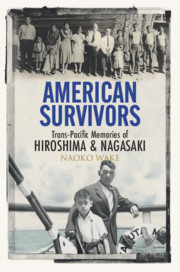Book contents
- American Survivors
- American Survivors
- Copyright page
- Dedication
- Contents
- Figures
- Abbreviations
- Notes on the Text
- Acknowledgments
- Introduction
- 1 Cities of Immigrants
- 2 Remembering the Nuclear Holocaust
- 3 Reconnecting Families
- 4 War and Work Across the Pacific
- 5 Finding Survivorhood
- 6 Endlessness of Radiation Illness
- Epilogue
- Notes
- Glossary
- Select Bibliography
- Index
5 - Finding Survivorhood
Published online by Cambridge University Press: 27 May 2021
- American Survivors
- American Survivors
- Copyright page
- Dedication
- Contents
- Figures
- Abbreviations
- Notes on the Text
- Acknowledgments
- Introduction
- 1 Cities of Immigrants
- 2 Remembering the Nuclear Holocaust
- 3 Reconnecting Families
- 4 War and Work Across the Pacific
- 5 Finding Survivorhood
- 6 Endlessness of Radiation Illness
- Epilogue
- Notes
- Glossary
- Select Bibliography
- Index
Summary
Chapter 5 discusses the rise of US survivors’ cross-national memory, identity, and activism in the 1970s. Working with younger non-survivors, older survivors, women in particular, broke silence and helped create a collective identity. This identity-making began as a handful of US survivors gathered in 1965 to share their bomb memories. Several years later, they worked with major Asian American organizations including the Japanese American Citizens Leagues, politicians of color such as Thomas Noguchi, Mervyn Dymally, and Edward Roybal, and antinuclear activists such as Yuji Ichioka and Karl G. Yoneda. This expansion of activism was possible because of US survivors’ memory-sharing. Female survivors, by serving as public faces of US survivors, challenged gender boundaries; male survivors, who formerly told stories of their bravery, began to tell how powerless they had felt on the ground. These developments were broadly relevant to Asian America of the era, which witnessed the rising critique of Japanese American incarceration during World War II, the Vietnam War that Asian Americans deemed America’s aggression against Asia, and an imminent use of nuclear weaponry in the Pacific region.
Keywords
- Type
- Chapter
- Information
- American SurvivorsTrans-Pacific Memories of Hiroshima and Nagasaki, pp. 213 - 262Publisher: Cambridge University PressPrint publication year: 2021



